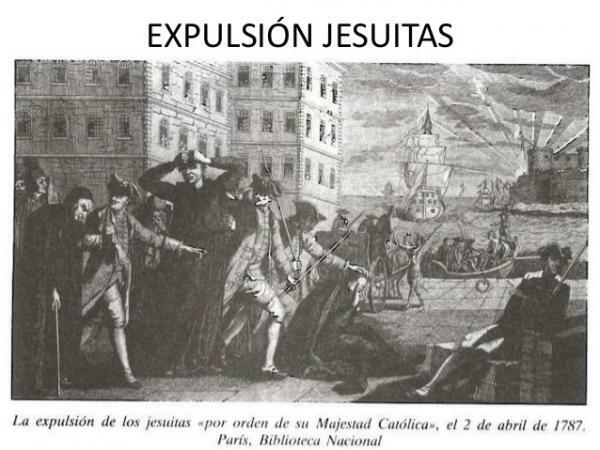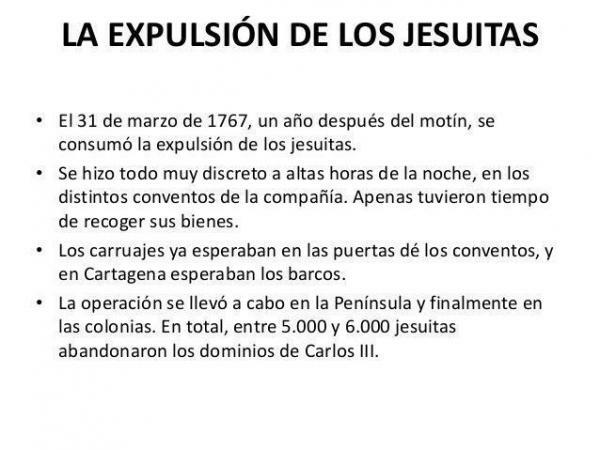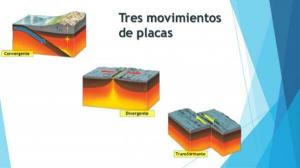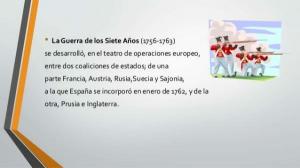The expulsion of the Jesuits from Spain in 1767

The Jesus company it was constituted as one of the basic pillars of the Counter-Reformation of the Catholic Church. In the eighteenth century, the arrival of the enlightened absolutist regimes caused a conflict for total political control in which the Jesuits will have the upper hand. Next, in this lesson from unPROFESOR.com we are going to study one of the episodes that marked the history of the 18th century: the summary of the expulsion of the Jesuits from Spain in 1767.
Index
- What was the Society of Jesus
- Enlightened despotism
- Causes of expulsion from Spain
- Consequences of the expulsion of the Jesuits in Spain
What was La Compañía de Jesús.
The Society of Jesus, founded by the Spanish Ignacio de Loyola (1491-1556) in 1534, emerged as one of the instruments of the Counter Reformationfor the combat of the Catholic Church against protestant reformation in all Europe.
The Jesuits will stand out as missionaries in half the world and as teachers in their European schools. Furthermore, as royal confessors they will advise Catholic sovereigns to ignore the rights of Protestants that limited their power.
There were three normative vows of religious life professed by the Jesuits: obedience, poverty, and chastity. To these must be added a quarter of absolute obedience to the Pope. This last vote will be the motive, as of the Illustration, that the states began to distrust the order.
Enlightened despotism.
The main objective of the Society of Jesus, the defense of Catholic orthodoxy and the propagation of the faith, came into conflict in the eighteenth century with the secularization processes that the enlightened movement proposed.
The attempt to reconcile monarchical absolutism with the reforming spirit of the Enlightenment led to the Enlightened Despotism, founded on the absolute power of the monarchy and on rational reforms for the progress of the people. In Spain, the king Carlos III It will be the paradigm and the greatest representative of this current.
The most important Catholic monarchies identified with enlightened despotism, coming into conflict with the Jesuits and leading to his expulsion from Portugal in 1759, from France in 1762, and finally from Spain in 1767.

Causes of expulsion from Spain.
The expulsion of the Jesuits from Spain in 1767 It is an operation carried out in the time of the reign of Carlos III, materialized with special stealth and great effectiveness.
There are various reasons to be used to carry out an action of this caliber, the traditional justification of the act being based on the responsibility of the Society of Jesus in riots of the spring of 1766, especially the so-called Esquilache, which took place in Madrid against the Minister of Finance of the Crown, on March 23 of the same year; although it is true that the authorities themselves recognized that the causes of the riots were fundamentally hatred of foreign ministers and problems due to the rise in prices of food of special necessity.
But between the real reasons for the expulsion several must be considered, taking into account the great social and political power that the order had in Spain:
- On the one hand, the Jesuits were considered servants of the Vatican, remaining against the prerogatives of the kings and their reforms and in conflict with the absolute monarchy, there are already previous cases that weighed, such as their expulsion from Portugal and France. In the Spanish case, we must add a certain isolation of the official church. Although the Company had support among nobles and sectors of the people, the expulsion order was applauded by the high clergy and even by other orders, such as Augustinians and Dominicans.
- In the social order, we must also add the accusation of having a dominant position in the education of the upper classes and even to defend a certain relaxed morality in their universities and colleges.
- Regarding the measures taken by Carlos III, this opened in April 1766 a Secret Investigation to find out the causes and those responsible for the riots and popular riots that had occurred. The person in charge of directing it was the Count of Aranda, which created an Extraordinary Council to direct the entire process, resulting in the expulsion of the Society of Jesus from Spain. Among the prosecutors, the work of Pedro Rodríguez will be highlighted Campomanes, an anti-Jesuit who was one of the main ideologues of the operation.

Consequences of the expulsion of the Jesuits in Spain.
The conclusions of the Investigation highlighted the need for the expulsion of the Jesuits and the occupation of their property, detailing the steps to be taken and the proper information to the Holy See. The text was imprecise when determining the causes of the expulsion, although it did point out the dangerousness of the congregation in order to maintain public order.
Carlos III ratified the entire process with the Royal Decree of Expulsion of February 27, which missed the Society of Jesus from all the domains of the Spanish Crown, taking the measure with great promptness and efficiency, to avoid any protest or maneuvering by the religious, between the night of March 31 and the morning of April 2, 1767.
According to data of the time, 2,746 Jesuits were expelled from Spain of 138 houses and schools of the Company, adding to these 2,630 in America and the Philippines, giving a total of 5,376.
If you want to read more articles similar to The Expulsion of the Jesuits from Spain in 1767 - Summary, we recommend that you enter our category of Story.



